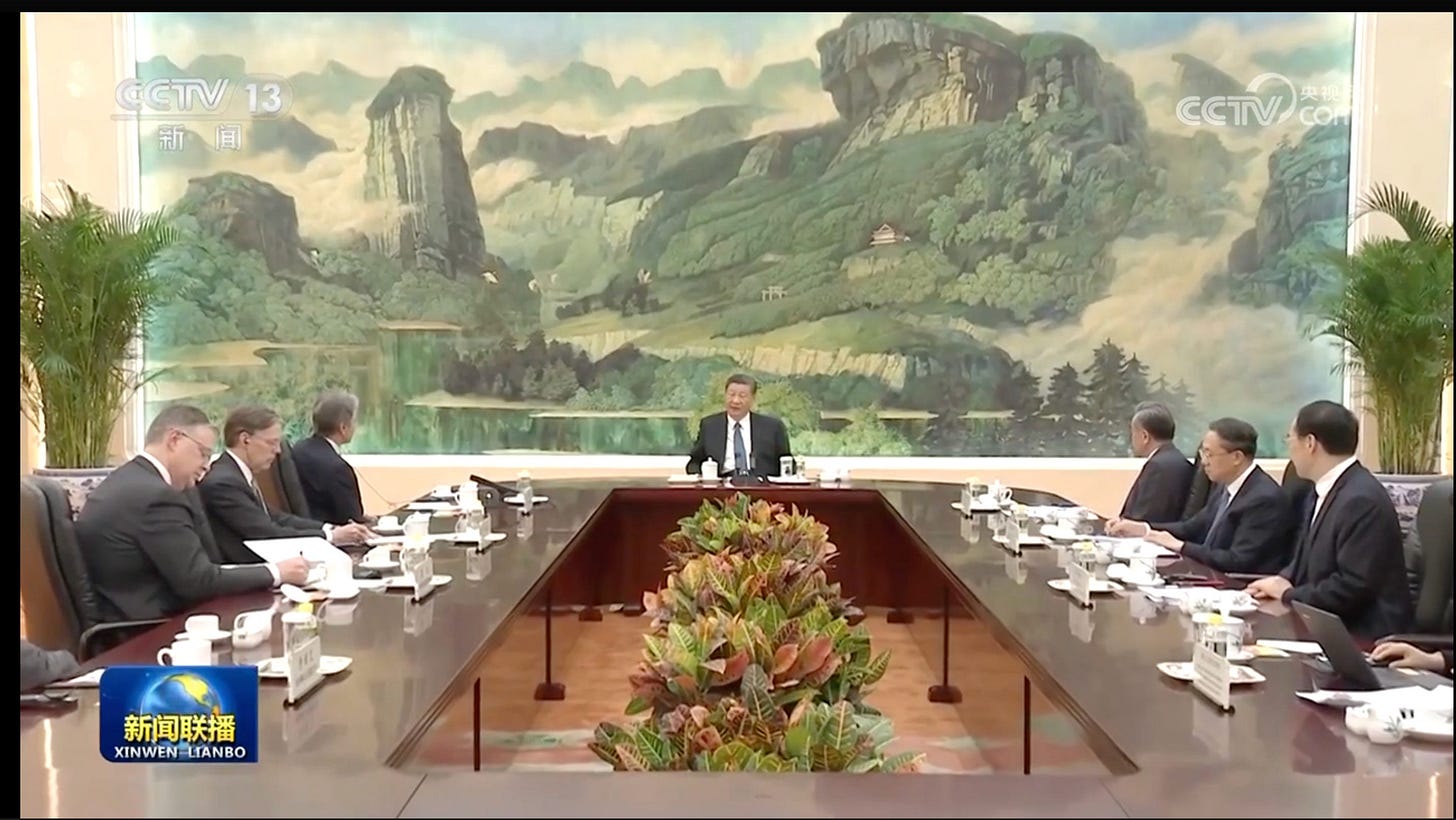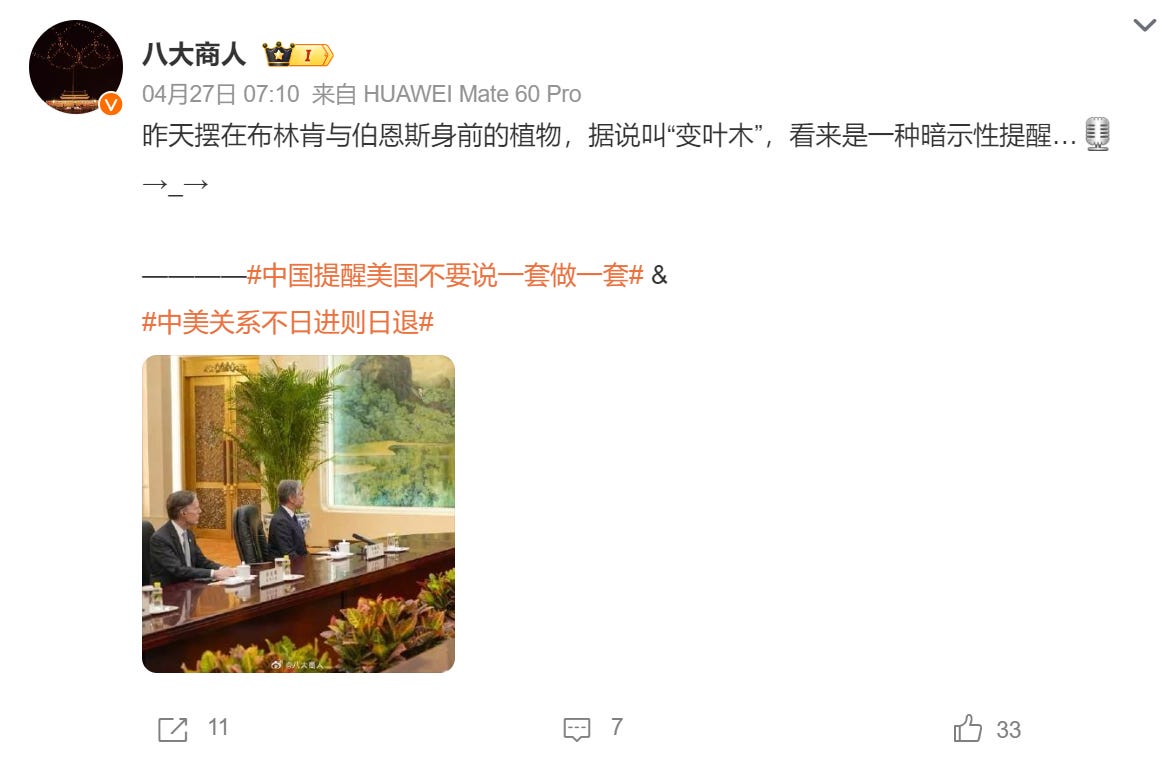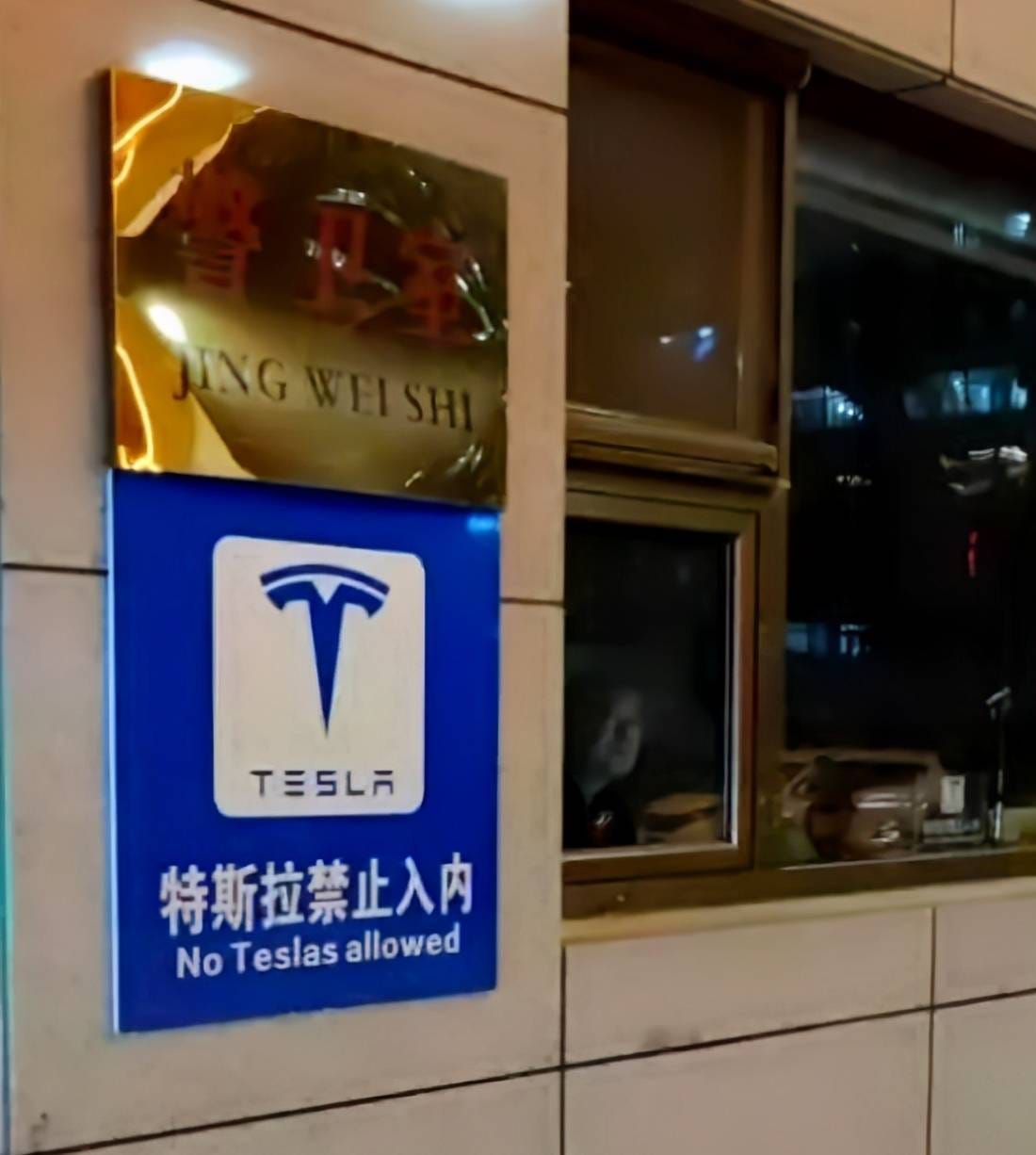Today's piece will be shorter than usual, as I will only cover a few key points that some China-watchers might be curious about regarding the recent visits of Secretary Blinken and Elon Musk to China. I'll keep everything straightforward and to the point, assuming many of you are already familiar with the news on these two visits.
1. Secretary Blinken's visit to China
1) Decorative plants
Chinese President Xi Jinping met with U.S. Secretary of State Antony Blinken at the Great Hall of the People in Beijing on Friday afternoon. This marked Blinken's second visit to China within a year, his previous visit being in June of the prior year, during which lotus flowers adorned the meeting room.
This time, however, Chinese netizens noted that the decorative plants were variegated leaf crotons. Although I'm no expert in botany—indeed, it was my weakest subject in middle school—I did verify through online photos that the plants resembled variegated leaf crotons.
It is said that the lotus symbolizes a love for peace, while the variegated leaf croton suggests something elusive or complex, echoing a common critique by China regarding U.S. actions in bilateral relations: "The U.S. should be trustworthy and resolute in action, not saying one thing and doing another."
While I believe it is a Chinese custom to imbue plants with symbolic meanings to convey goodwill, I am skeptical that this practice is a standard tactic in diplomacy. Instead, it appears to be a topic of interest among observers of Chinese foreign policy, despite the myriad other ways these nations communicate.
2) Taylor Swift & Dou Wei
Before leaving Beijing, Blinken visited a local record store, where he purchased an album by Taylor Swift and one by the legendary Chinese rock musician Dou Wei.
Initially, when I saw Blinken attending a Chinese Basketball Association game in Shanghai during this trip, I thought it might signal a shift towards "sports diplomacy," contrasting with Yellen's earlier "culinary diplomacy" in China. However, I overlooked Blinken's interest in music. His itinerary in China, which included sampling local snacks in Shanghai and engaging in sports and music, was diverse and multifaceted. Thus, it's challenging to encapsulate the softer aspects of his visit with a single term.
Additionally, some have questioned why Blinken didn't purchase Taylor Swift's album in the United States, opting instead to buy it in China. On Chinese social media, there's speculation that Blinken's purchase was a symbolic gesture, suggesting that while China's hard power may be increasingly comparable to that of the U.S., there is still a significant gap in soft power. While it's unclear whether Blinken intended to send this message, he did comment during the purchase that the album was "a successful American export,” according to a report by Reuters. You can also say it's an example of efforts to improve "people-to-people" exchanges.
3) Overcapacity
Politicians from both the U.S. and China are discussing the "overcapacity" issue now and numerous Chinese media outlets and experts have published comments and analyses on the issue. I've tried to summarize the perspectives from Chinese media and experts, which I believe can be encapsulated as follows: Many argue that "overcapacity" can emerge at different times and be viewed from various perspectives globally. (See a piece penned by Liu Ying, a research fellow of Chongyang Institute for Financial Studies). The U.S. accusation of Chinese overcapacity is seen as an attempt to politicize the issue, and China rejects being singled out for overcapacity at this time. China believes that if it is to be criticized for overcapacity, then many other countries, including the U.S., also face similar issues, making such critiques unfair. The international success of Chinese products, such as electric vehicles, is seen as a manifestation of China's competitive advantage.
Furthermore, prominent Chinese scholar Zheng Yongnian suggests in a recent article which was published on WeChat that "China should not shy away from discussing the impact of its exports on some developing nations. Although the notion that not only Western countries but also emerging economies like Brazil, India, and Mexico are aligning against China may be exaggerated, theoretically and practically, China’s exports due to its comparative advantages in certain industries do indeed exert influence and pressure on these economies, at least in some sectors. In response, China needs to adopt more open policies towards these countries and import more of their competitively advantageous products."
2. Elon Musk's visit to China
Yesterday afternoon, I was browsing videos on my phone when I came across reports of Elon Musk's sudden visit to China. Later that evening, I saw the most important program on TV is 新闻联播 Xīnwén Liánbō/News Simulcast showing Chinese Premier Li Qiang meeting with Musk, and I couldn't help but marvel at how quickly Musk and the Chinese government arranged this visit.
Today, on China's internet, many are sharing news that some local driving bans on Tesla are about to be lifted. This coincided with Musk's arrival in China on Saturday, when a Chinese industrial association published a list of 76 models of intelligent connected vehicles that meet the country's auto data security requirements, including those from BYD and Tesla.
The American carmaker has been assessed by the China Association of Automobile Manufacturers (CAAM), a government-backed industry consortium, and given the all-clear for its protection of privacy in handling of personal data, which encompass facial recognition, and the collection and processing of cockpit data.
The result of the review on Sunday evening coincides with CEO Elon Musk’s visit to Beijing where he met Chinese Premier Li Qiang to discuss Tesla’s operations in the world’s largest electric vehicle (EV) market.
Tesla said in a statement that the endorsement of its Model 3 and Model Y vehicles assembled at the Shanghai Giga factory would lead to an easing of restrictions on its cars’ access to certain state-backed entities, airports and motorways.
......
The endorsement also bodes well for the approval of Tesla’s Full Self-Driving (FSD) system, its autonomous driving software, in China.
During his meeting with Musk on Sunday, Premier Li said Tesla’s operations in China represented a successful example of an economic tie-up between China and the US as he encouraged more cooperation between the two countries.
The English headline from Xinhua about this news prominently featured Tesla and it did not mention other car brands that passed this assessment.
A Chinese industrial association has published a list of 76 models of intelligent connected vehicles that meet the country's auto data security requirements, including those from BYD and Tesla.
My friend has indeed encountered situations at some local government facilities in China where driving a Tesla was not permitted entry. The security guards often don’t explain the reason, but many speculate it’s due to concerns about the potential risk of Tesla's data being leaked outside of China. Additionally, when I test-drove a Tesla, the salesperson informed me that due to Chinese government policies, the full capabilities of Tesla’s FSD system, such as navigating through traffic lights, are not available in China.
I think that if Tesla could not only gain access to previously restricted government sites but also receive full approval for its FSD system, it would be beneficial both for Tesla and China. China is a huge market for Tesla, and as China is currently ascending in the international electric vehicle market, fully liberalizing its autonomous driving policies could spur domestic electric vehicle companies to intensify their efforts in this area.
Moreover, the complex road conditions in China (which anyone who has driven in China would understand) might also provide an unparalleled wealth of data for the development of autonomous driving systems, potentially enhancing the intelligence of related products? And this would enhance their competitive edge internationally, which I mentioned earlier.
I welcome your thoughts and comments on this issue.





So massive and coordinated was the media blitz for Taylor Swift that I suspect she was used to sustain America's claimed monopoly of 'soft power'.
Her music is professional, evanescent , white bread pop. Sort of appropriate, I suppose.
Are you aware that FSD is not autonomous at all--it is milabeled, falsedly advertised. It requires "the driver" to keep his hands on the wheel at all times and pay attention to the road! Are you aware that FSD had been available in the US for 4 years, and HAS NOT resulted in Tesla gaining market share?